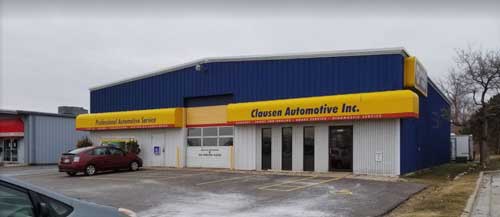8 Facts to Know About Tires!
Many vehicle owners think that tires are just a necessary evil and will often put off purchasing new tires as long as possible. This means they are paying for frequent tire service and inconvenient repairs. Hopefully, the fun facts in this article about the newest trends and technologies in tires will inspire many drivers to pay more attention to the round black objects that keep them rolling down the road.
Here are eight interesting facts about tires:
- Skinny tires are back -- Skinny tires rely on minimal rolling resistance to achieve acceptable driving range, while also improving fuel efficiency.
- Wider treads increase cornering grip, but do not improve acceleration or braking traction -- Some manufacturers of skinnier tires increase the road-holding with a stickier compound. Adversely, wider tires crowd the mechanicals and shrink the passenger compartment.
- Static electricity build-up -- An inadequately grounded vehicle is a continuing issue during refueling and when occupants slide out of the car. Modern tire compounds have become less conductive as the amount of carbon black in rubber compounds have been reduced to cut weight and rolling resistance.
- Don't expect spares to become obsolete -- Despite the abundance of roadside assistance, inflator kits, and run-flat tires, nothing matches the peace of mind of having a spare in the trunk, even though many drivers never intend to fix a flat on the road.
- A run-flat tire is good after it loses pressure -- Tire manufacturers claim that a deflated run-flat can cover 50 miles at 50 mph. The slower you go, the farther you can go.
- Tire manufacturers are working to reduce weight -- The challenge is to reduce the gauge of the steel cord, which trims weight, without diminishing the tire's ability to survive roads with potholes, broken pavement, and other hazards. Some engineers are working to reduce the weight at the tread, as this has the greatest effect on reducing the inertia of the tire and wheel.
- There are more than 200 different materials in the typical tire – Steel belts, Kevlar-like plies, and rubber are commonly known materials. The rubber contains metals, including cobalt and titanium, to help the compound bond with the steel belts. Citrus oil is used in some tires to control how the tread viscosity changes with temperature. Silane (silicon hydride) is used as an efficient coupling agent between inorganic silica—used to enhance wet and snow traction--and the more traditional organic polymers in the tread.
- Airless tires -- Several manufacturers have experimented with airless tires that combine a wheel and a tire in one composite molding. These are now in production for low-speed industrial and off-road (lawnmower, skid steer) applications.
Have questions about what kind of tires to purchase for your vehicle? Contact our ASE Certified Technicians at Clausen Automotive by calling (608) 221-8321 for more information about tire service. Since 1975, our family-owned auto shop has proudly served vehicle owners in Madison, WI, and surrounding communities.

Many vehicle owners think that tires are just a necessary evil and will often put off purchasing new tires as long as possible. This means they are paying for frequent tire service and inconvenient repairs. Hopefully, the fun facts in this article about the newest trends and technologies in tires will inspire many drivers to pay more attention to the round black objects that keep them rolling down the road.
Here are eight interesting facts about tires:
- Skinny tires are back -- Skinny tires rely on minimal rolling resistance to achieve acceptable driving range, while also improving fuel efficiency.
- Wider treads increase cornering grip, but do not improve acceleration or braking traction -- Some manufacturers of skinnier tires increase the road-holding with a stickier compound. Adversely, wider tires crowd the mechanicals and shrink the passenger compartment.
- Static electricity build-up -- An inadequately grounded vehicle is a continuing issue during refueling and when occupants slide out of the car. Modern tire compounds have become less conductive as the amount of carbon black in rubber compounds have been reduced to cut weight and rolling resistance.
- Don't expect spares to become obsolete -- Despite the abundance of roadside assistance, inflator kits, and run-flat tires, nothing matches the peace of mind of having a spare in the trunk, even though many drivers never intend to fix a flat on the road.
- A run-flat tire is good after it loses pressure -- Tire manufacturers claim that a deflated run-flat can cover 50 miles at 50 mph. The slower you go, the farther you can go.
- Tire manufacturers are working to reduce weight -- The challenge is to reduce the gauge of the steel cord, which trims weight, without diminishing the tire's ability to survive roads with potholes, broken pavement, and other hazards. Some engineers are working to reduce the weight at the tread, as this has the greatest effect on reducing the inertia of the tire and wheel.
- There are more than 200 different materials in the typical tire – Steel belts, Kevlar-like plies, and rubber are commonly known materials. The rubber contains metals, including cobalt and titanium, to help the compound bond with the steel belts. Citrus oil is used in some tires to control how the tread viscosity changes with temperature. Silane (silicon hydride) is used as an efficient coupling agent between inorganic silica—used to enhance wet and snow traction--and the more traditional organic polymers in the tread.
- Airless tires -- Several manufacturers have experimented with airless tires that combine a wheel and a tire in one composite molding. These are now in production for low-speed industrial and off-road (lawnmower, skid steer) applications.
Have questions about what kind of tires to purchase for your vehicle? Contact our ASE Certified Technicians at Clausen Automotive by calling (608) 221-8321 for more information about tire service. Since 1975, our family-owned auto shop has proudly served vehicle owners in Madison, WI, and surrounding communities.


